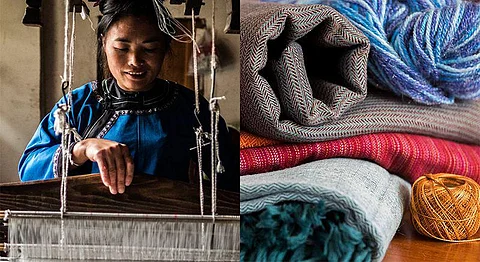
- HOMEGROWN WORLD
- #HGCREATORS
- #HGEXPLORE
- #HGVOICES
- #HGSHOP
- CAREERS
- ABOUT US
- CONTACT US

Women empowerment in the rural pockets of India is essential for the overall societal development. It is crucial that women are educated, empowered, given opportunities without limitations, for it is the only way forward.
Himadri Hans Handloom – a company that has designed programme interventions to address women’s challenges and celebrate their achievements, are committed to their empowerment in Kumaon region of Uttarakhand. Here, unskilled women of deserted areas of the region are trained in Handloom weaving & allied activities to create important assets for extremely poor or landless households. Understanding the needs and providing sustained livelihoods to the destitute women members of the society by recognizing & building their skills, thereby enabling them to overcome their hardships is an extremely necessary and crucial step.
Aiming to cover the women artisans of Uttarakhand, where these women are working from their scattered house, they want to help them get the right training and connect them to the market. There are around 7-8 such clusters so far where almost 5000 women have been working locally on the looms in their houses.
Initial phases
The initiative took place almost 17-18 years ago when a bunch of local women like Munni Bisht decided to come together. Women then were considered to be housewives with no financial power nor did they have any say in the social conversations. It was very difficult for the families to realize that if the women of the house work half the day, the house can still run. A typical day in the life of woman in the hills begins at around 4:00 am with household work, cleaning, taking care of cattle, cooking food, fetching water and work in farms and finally ends at 11:00 pm. In such a scenario, families couldn’t imagine a smooth running life, if their daughter in law/wife goes to work from 10 to 5.
But finally, with the help of a local NGO they were able to get trained on spinning, carpet making and weaving. Over the period of time, they came under one roof at a weaving centre, which empowers upto 95% of women in Almora today. The local NGO then approached, The Hans Foundation (THF), a charitable organization, who started supporting and taking care of the units and women artisans. They made sure that all women got fair wages, provision of regular health check-ups, toilets and cooking gas for the ones who didn’t have one. Today, they feel proud of themselves having achieved their financial power.
Some success stories
Manju Bisht, resident of village Bhuluda, Almora, is one of the first women to get associated with HHH. Initially starting as a trainee with wages of Rs. 500 per month, she was trained in handloom weaving. Today she works as the Master Weaver and trainer with wages of Rs. 8700 per month. She proudly says- “Today, I am an Independent woman having self-esteem in the society and earning a decent livelihood. I wish that our institution flourish so that more and more needy women of the region can get the benefit of sustainable livelihoods.”
Ms. Noorie Khan, another member of this company, hailing from the suburban areas of Almora, joined in 1997 with Panchachuli Women Weavers, where she received primary skill training in stitching, embroidery and knitting and was paid monthly wages of Rs1600/month. But when things got really challenging, she received aid from HHH and now works as their Master Knitter, where she earns a monthly income of Rs. 7200, which helped her educate her dependent brothers and build a house. She says – “I was able to provide medical aid to my brother who suffered from cardiac arrest, got a gas connection, and now living a dignified life. I wish a bright future of the institution and wish that more needy women like me may be empowered to live a happy life.”
Growing market
The biggest challenge was to find the right market for handmade products for the weavers. With the competition in this sector rising high, especially due to advance technological aids and the market being niche and small, initially it was restricted to local areas like Nainital, Ranikhet, Mukteshwar and Almora.
But today we have a market which believes in sustainable and ethical fashion, which is always upheld by this company while empowering their women artisans. With a lot of appreciation received for their Pure Pashmina from the foreign tourists, they have regular buyers from Germany, Riyadh, Bahrain, Norway and many more, apart from 8 outlets in Uttarakhand and one in Delhi.
Also, to claim their authenticity, they have received certifications like Handloom Mark, Craftmark and Fair Trade, which provide assurance to buyers.
Future Plans
With a wish to cater to more European countries and other markets like Australia, Japan, USA, since they are one of the biggest importers of handmade clothes from India, HHH plans to approach designer brands, boutiques, designers who wish to work in sustainable and ethical fashion. With their new collection in hemp, nettle, silk, cotton and bamboo yarn they are trying to cover the home and office furnishing category with natural fibres. With an aim to target around 5000 women weavers to market after providing them proper training to enable them to market driven product and quality, they are an example showcasing the perfect threading of sustainable fashion and women empowerment.
If you enjoyed reading this article, we suggest you read:
